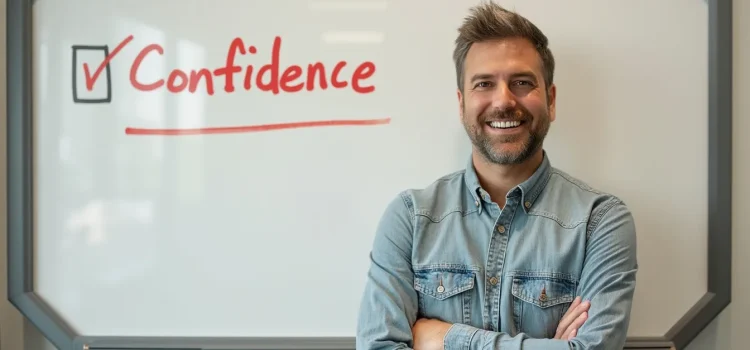
How much of your confidence stems from external validation versus genuine self-knowledge? What separates authentic confidence from its superficial counterpart?
In Unoffendable, Einzelgänger explores the essence of true confidence and how it emerges from personal growth rather than ego. He reveals that genuine self-assurance comes from understanding our capabilities and accepting our limitations, not from collecting compliments or social approval.
Read on to understand the foundations of authentic confidence.
True Confidence
True confidence, rooted in virtue and personal growth, differs fundamentally from false confidence that’s based on ego and external validation. Einzelgänger explains that authentic confidence develops from our actual skills and actions rather than from others’ opinions or approval.
Genuine self-assurance comes from deeply understanding both our capabilities and our limitations. Instead of seeking validation from others, we build true confidence through our own accomplishments and demonstrated abilities. This authentic confidence requires honest self-reflection and an acceptance of our vulnerabilities.
To develop this kind of confidence, we must maintain an accurate and balanced assessment of ourselves. This means moving beyond rigid self-perceptions and acknowledging both our strengths and the areas where we need improvement. Rather than maintaining a fixed view of our abilities, we should understand that we are constantly evolving.
The key is to maintain a growth mindset, understanding that our capabilities aren’t fixed traits but rather skills that can be developed and refined through dedicated practice and consistent effort.
| Shortform Note Adopting a growth mindset can lead to greater resilience and adaptability in personal and professional life, as it encourages continuous learning and improvement. This perspective is supported by neuroscience research, which demonstrates the brain’s capacity for change and adaptation through neuroplasticity, confirming that personal abilities are not fixed. Consistent effort and persistence are key components in developing abilities, as they enable individuals to overcome challenges and setbacks. This approach is enhanced by constructive feedback from peers, mentors, or coaches, who can provide valuable insights into areas of strength and those needing improvement. In professional environments, this mindset can lead to more effective teamwork and leadership, as individuals are more open to feedback and collaboration. Emphasizing lifelong learning is crucial, involving the pursuit of new knowledge, skills, and experiences that contribute to personal and professional development. Additionally, maintaining a balanced view can reduce anxiety and stress by setting realistic expectations for ourselves, thus avoiding the pressure of trying to be perfect or excel in every area. |
The Nature of Confidence
True confidence, as Einzelgänger explains, doesn’t come from the absence of fear but rather emerges when we choose to take action despite our doubts and fears. It is precisely when we feel afraid yet still move forward that we demonstrate genuine courage.
We can develop greater bravery and resilience in pursuing our dreams by accepting two key truths: that life is inherently uncertain, and that we possess the capability to handle whatever challenges arise along our path.
(Shortform note: Having a strong support system is fundamental to building and maintaining courage in our lives. Friends, family, and mentors can provide the encouragement and perspective needed to face challenges head-on, making it easier to take courageous actions. When we demonstrate courage and overcome our fears, we often experience significant personal growth and increased confidence in our abilities. This growth can be further enhanced through mindfulness and meditation practices, which teach us to remain present and accept uncertainty with grace. These practices help develop a calm and resilient approach to life’s challenges, while also enabling us to be more resourceful in using available tools and opportunities to solve problems effectively.)
The Core of Confidence
True self-confidence, according to Einzelgänger, emerges through authentic and transparent behavior. Our genuine sense of self-worth develops when we embrace our individuality and accept our flaws, rather than seeking validation from others.
Einzelgänger emphasizes that imperfections and vulnerabilities are natural aspects of being human. We are all imperfect beings in a constant state of growth and development, making it unnecessary to pursue an unattainable ideal of perfection.
When we approach our flaws with self-compassion, we can recognize that our vulnerabilities aren’t weaknesses to hide, but rather elements that can enhance our resilience and create deeper connections with others.
| Shortform Note The relationship between imperfection, vulnerability, and personal growth is deeply nuanced and varies across cultures. Different cultures have varied attitudes towards imperfection; for example, Japanese aesthetics often celebrate imperfection through concepts like “wabi-sabi,” which finds beauty in the imperfect and transient. This acceptance of imperfection can be tremendously beneficial, as perfectionism often stifles creativity and prevents experimentation with new ideas. Moreover, vulnerabilities often expose us to failure, which can be a powerful teacher, helping us build resilience through developing problem-solving skills and perseverance. The embrace of imperfection and vulnerability has broader social implications as well. Societal acceptance of imperfections can lead to more inclusive environments where diversity is valued and different perspectives are appreciated, contributing to collective growth. Vulnerability can break down social barriers and hierarchies by emphasizing equality and shared humanity rather than differences or status. To cultivate this acceptance, various techniques such as self-kindness exercises, reflective journaling, and guided meditations focused on acceptance and understanding can be particularly helpful in developing self-compassion. |






